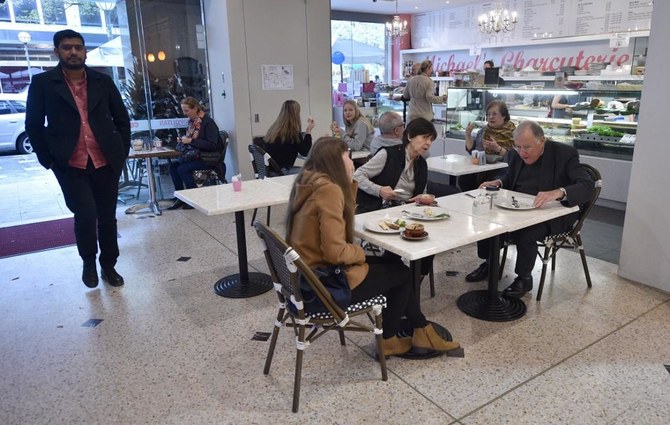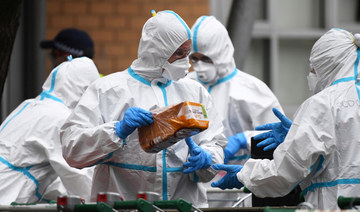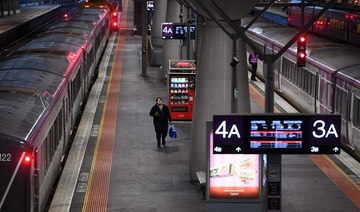SYDNEY: Sydney residents were warned Monday to put the brakes on partying as a new coronavirus cluster emerged at a city pub on the heels of a major outbreak in Melbourne.
Three pubs in Sydney and its surrounds were closed after being linked to outbreaks or failing to comply with social distancing requirements, while other events were under investigation with Australia on edge over a resurgence of the virus.
The new cluster emerged after Melbourne entered a six-week lockdown on Thursday, and surrounding Victoria state was sealed off from the rest of the country in an effort to contain the virus.
Authorities reported 177 new infections in and around Melbourne Monday, marking a week of triple-digit increases.
New South Wales police assistant commissioner Tony Cooke on Monday slammed the “moronic behavior of people at dance parties,” after local media published footage of large private get-togethers in Sydney’s wealthy eastern suburbs.
City residents are allowed a maximum of 20 visitors to their homes under restrictions which have been gradually eased in recent weeks as the number of infections dwindled.
At least 21 infections have now been linked to a growing cluster at Sydney’s Crossroads Hotel — a popular drinking spot on a major traffic route — raising concern the virus could be spreading in the state.
A dozen military personnel who visited the pub while poised to deploy on an anti-virus mission were on Monday in isolation at an army base in rural New South Wales.
The state’s police minister David Elliott warned that if the situation was not brought under control, pubs could be closed again.
“If we have to close hotels and clubs again, the patrons will have to take some of the ownership of that,” he told a press conference Monday.
“I will, however, work to my dying breath to make sure that that doesn’t happen.”
Concern over new Sydney cluster as Australia coronavirus cases surge
https://arab.news/45wyv
Concern over new Sydney cluster as Australia coronavirus cases surge

- New South Wales police assistant commissioner Tony Cooke slams ‘moronic behavior of people at dance parties’
Bangladeshi police arrest student protest leaders from hospital

- Police say they arrested three student leaders ‘to keep them safe’
- Two of them were still undergoing treatment, hospital worker says
DHAKA: Bangladeshi police have discharged from hospital and arrested the leaders of a student protest that led to nationwide unrest last week, when security forces clashed with demonstrators.
Students have been demonstrating since the beginning of July against a rule that reserves a bulk of government jobs for the descendants of those who fought in the country’s 1971 liberation war.
At least 209 people have been killed and thousands injured, according to a count based on reports in the local media after the protests turned violent last week.
Most of the casualties were reported in Dhaka, which saw intense clashes between protesters, government supporters, police and paramilitary troops, when the country went into a communications blackout for six days.
Among the injured were student leaders Nahid Islam and Asif Mahmud, coordinators of Students Against Discrimination, the main protest organizing group. They were patients at Gonoshasthya Hospital in Dhaka, from where they were arrested by the Detective Branch of Dhaka Metropolitan Police on Friday evening. Another student leader visiting Islam and Mahmud, Abu Baker Majumder, was detained as well.
Detective Branch chief Harun Or-Rashid told reporters in Dhaka on Saturday that the trio had been detained “for security reasons” as their families were worried about their safety.
“We took them in our custody to keep them safe,” he said.
The student leaders were arrested by a group of more than a dozen plainclothes officers despite objections from medical staff, a hospital worker told Arab News.
“At first, we tried to make them understand that without proper protocols, admitted patients couldn’t be released from the hospital. Later on, they talked with our authorities, and the students were taken from the hospital. There was no way we could hold them further,” the hospital worker said on condition of anonymity.
“The students’ health was not so good ... Asif was dealing with low blood pressure, and Nahid was suffering from blood clots and bruises on different parts of his body. Both of them needed further treatment.”
The arrests come in a crackdown launched by police in Dhaka, where a curfew imposed last week was still in place.
Liton Kumar Saha, joint commissioner of the Dhaka Metropolitan Police, said that 2,284 people have been arrested in Dhaka over the protest-related clashes, in which numerous administration offices were set on fire.
“We are analyzing the footage of different places and identifying the miscreants. When we get confirmed about someone’s involvement in the anarchy, we conduct the operations to arrest them. It has been conducted with transparency, and we are checking the people who were involved with sabotage,” he told Arab News.
“In the last 24 hours, 245 persons were arrested in Dhaka. Our drive will continue until the situation gets normal.”
International rights groups have repeatedly raised concerns over Bangladesh’s handling of the protests, with Amnesty International saying that witness testimonies and video and photographic evidence “confirm the use of unlawful force by the police against student protesters.”
The protests broke out after the High Court upheld a controversial quota system, in which 56 percent of public service jobs were reserved for specific groups, including women, marginalized communities and children and grandchildren of freedom fighters — for whom the government earmarks 30 percent of the posts.
The Supreme Court last week scaled back the quota system, ordering 93 percent of government jobs to be allocated on merit.
Indian PM Modi likely to visit Ukraine in August, local media reports
There was no immediate response from India’s foreign ministry
NEW DELHI: Indian Prime Minister Narendra Modi is likely to visit Ukraine next month, a local media report said, his first visit to the country since its war with Russia began and just weeks after he met Russian President Vladimir Putin in Moscow.
Ukraine’s embassy in New Delhi said it had no information to share immediately. There was no immediate response from India’s foreign ministry.
Western countries have imposed sanctions on Moscow following its all-out invasion of Ukraine in 2022, but “friendly” nations such as India and China have continued to trade.
India has refrained from directly blaming Russia, while urging the two nations to resolve their conflict through dialogue and diplomacy.
Modi met Putin just as a Russian missile struck a hospital in Kyiv killing at least 41 people. The Indian leader told Putin that the death of innocent children was “painful and terrifying.”
Ukraine’s President Volodymyr Zelensky expressed unhappiness over Modi’s visit, calling it a “huge disappointment and a devastating blow to peace efforts” to see him hug “the world’s most bloody criminal in Moscow on such a day.”
Russia denied striking the hospital.
The US State Department has raised concerns over India’s relationship with Russia especially at a time when it has been seeking to strengthen ties with India as a potential counterweight to an ascendant China.
New Delhi is seeking to deepen its relationship with the West while keeping ties intact with Russia.
The final date of Modi’s visit is not yet confirmed, The Print reported on Saturday.
Indian Prime Minister Narendra Modi is likely to visit Ukraine next month, a local media report said, his first visit to the country since its war with Russia began and just weeks after he met Russian President Vladimir Putin in Moscow. (AFP/File)
French minister says foreign involvement not ruled out in rail sabotage

- “Who is responsible? Either it’s from within, or it’s been ordered from abroad, it’s too early to say,” Interior Minister Gerald Darmanin said
- Two security sources said on Friday the modus operandi meant initial suspicions fell on leftist militants or environmental activists
PARIS: France’s interior minister said on Saturday he could not rule out foreign involvement in an attack that sabotaged signal stations and cables on the country’s high-speed rail network, causing travel chaos on the opening day of the Olympic Games.
Friday’s pre-dawn attacks damaged infrastructure along the lines connecting Paris with cities such as Lille in the north, Bordeaux in the west and Strasbourg in the east. Another attack on the Paris-Marseille line was foiled, SNCF has said.
There has been no immediate claim of responsibility.
“Who is responsible? Either it’s from within, or it’s been ordered from abroad, it’s too early to say,” Interior Minister Gerald Darmanin told France 2 television.
He added: “We have uncovered a certain number of elements which lead us to believe that we will know fairly quickly who is responsible.”
Two security sources said on Friday the modus operandi meant initial suspicions fell on leftist militants or environmental activists, but that there was not yet any evidence.
Traffic on France’s high-speed rail network should be back to normal by Monday, Transport Minister Patrice Vergriete and rail operator SNCF’s chief Jean-Pierre Farandou told reporters on Saturday.
SNCF reiterated that transport plans for teams competing in the Paris 2024 Olympics would be guaranteed.
On Friday, 100,000 people could not take their trains, and another 150,000 faced delays but eventually got to their destinations, Vergriete said.
“There will still be disruptions tomorrow,” Vergriete said. “From Monday, there is no need to worry.”
French train networks partially restored after line sabotage ahead of Olympics

- Despite the disruptions, SNCF railway company says all transportation for Olympic teams, accredited personnel will be maintained
- The sabotage incidents have raised concerns about security as Paris hosts the Olympics, with authorities actively investigating
PARIS: French railway company SNCF said Saturday it has made progress in partially restoring high-speed train services after acts of sabotage disrupted three major lines ahead of Friday night’s Olympic Games opening ceremony on the Seine River.
SNCF said its agents worked through the night in adverse weather conditions to improve the TGV traffic from the north, east and west to Paris. As of Saturday morning, normal service had resumed on the Eastern high-speed line.
“On the North, Brittany and South-West high-speed lines, seven out of 10 trains on average will run with delays of one to two hours,” SNCF said.
The company added that traffic will continue to be disrupted on the North axis on Sunday, but conditions are expected to improve on the Atlantic axis for weekend returns. Customers are being contacted via text message and email to confirm the running of their trains.
Despite the disruptions, SNCF said all transportation for Olympic teams and accredited personnel will be maintained as planned.
The sabotage incidents have raised concerns about security as Paris hosts the Olympics. French authorities are actively investigating but say that no suspects have been identified or apprehended so far.
IOC apologizes for South Korea gaffe in Olympics opening ceremony

- The error sparked displeased reactions in South Korea
Seoul: The International Olympic Committee apologized Saturday for a gaffe during the opening ceremony of the Paris Olympics in which South Korean athletes were incorrectly introduced as North Korean.
As the South Korean delegation sailed down the Seine river in the French capital, they were introduced with the official name for North Korea: “Republique populaire democratique de Coree” in French, then “Democratic People’s Republic of Korea” in English.
“We deeply apologize for the mistake that occurred when introducing the South Korean team during the broadcast of the opening ceremony,” the IOC said in a post on its official Korean-language X account.
The error sparked displeased reactions in South Korea, a global cultural and technological powerhouse that is technically still at war with the nuclear-armed and impoverished North.
The Korean Sport & Olympic Committee said later Saturday that it had received a message from the IOC indicating that its chief, Thomas Bach, wished to directly apologize to the president of South Korea over the phone.
Earlier, South Korea’s sports ministry said in a statement it “expresses regret” over the “announcement during the opening ceremony of the 2024 Paris Olympics, where the South Korean delegation was introduced as the North Korean team.”
Second vice sports minister Jang Mi-ran, a 2008 Olympic weightlifting champion, has asked for a meeting with IOC chief Bach to discuss the matter, it added.
The country’s foreign ministry said in a statement it had contacted the French embassy in Seoul which expressed regret over what it said was an “incomprehensible mistake.”
North Korea was correctly introduced with the country’s official name.
Relations between the two Koreas are at one of their lowest points in years, with the North bolstering military ties with Russia while sending thousands of trash-carrying balloons to the South.
In response, Seoul’s military blasts K-pop and anti-regime messages from border loudspeakers and recently resumed live-fire drills on border islands and near the demilitarised zone that divides the Korean peninsula.


















